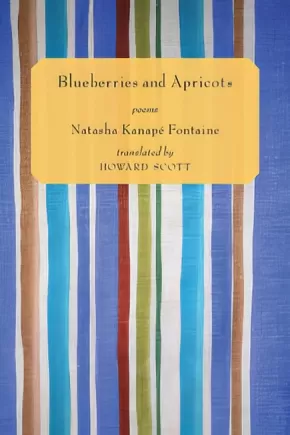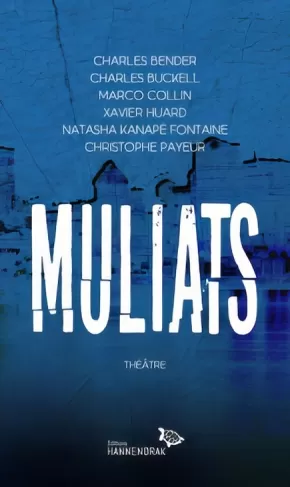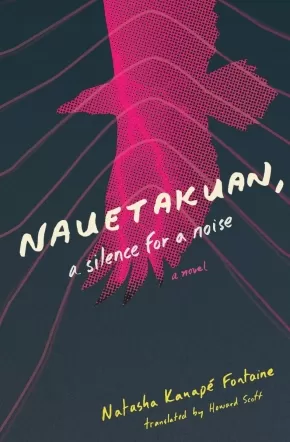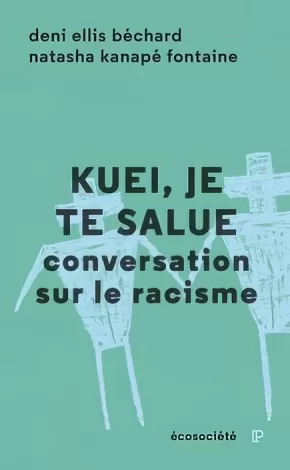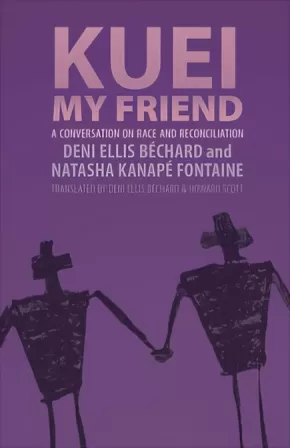Natasha Kanape Fontaine
Born in 1991, Natasha Kanapé Fontaine is Innu, originally from Pessamit on Quebec’s North Shore.
Poet-performer, actor, visual artist, and activist for Indigenous and environmental rights, she lives in Montreal. Her first collection of poems, Do Not Enter My Soul in Your Shoes (translated by Howard Scott; Mawenzi House, 2015), recounts her initial identity questioning and was hailed by critics, earning her the 2013 Prix littéraire des Écrivains francophones d’Amérique. A finalist at the 2015 Prix Émile-Nelligan, her second collection Assi Manifesto (Mawenzi House, 2016) offers a song to our planet Earth, suffocating as a result of the exploitation of natural resources, of tar sands in particular. Her third collection of poetry, Blueberries and Apricots (Mawenzi House, 2018) carries “the speech of the Indigenous woman, coming back to life to reverse history.” Kuei, My Friend: A Conversation on Race and Reconciliation (Talonbooks, 2018) is an epistolary exchange with celebrated Québécois-American author Deni Ellis Béchard. Translated into English by Howard Scott, Kanapé Fontaine’s books are now crossing borders and delighting audiences in Canada and around the world.
Kanapé Fontaine’s artistic and literary approach tends to bring together divergent peoples through dialogue, exchange, the sharing of values, and through the “tanning of skins” – a metaphorical way of scratching off the imperfections of thoughts and consciences. With poetry, she cradles environment and initiates a healing process. Kanapé Fontaine fights against racism, discrimination, and colonial mentalities through public speaking and poetry. She is often a guest poet, notably in Haiti, Belgium, France, Germany, Colombia, Scotland, and New Zealand (Aotearoa).
Books (3)
Synopsis:
In this, her third volume of poetry, this Aboriginal writer from Quebec again confronts the loss of her landscape and language.
On my left hip
a face
I walk
I walk upright
like a shadow
a people on my hip
a boatload of fruit
and the dream inside
women and children first
"A cry rises in me and transfigures me. The world waits for woman to come back as she was born: woman standing, woman powerful, woman resurgent. A call rises in me and I've decided to say yes to my birth."
Reviews
"Poetess, painter, actress, slammer ... Natasha Kanapé Fontaine speaks with a soft voice, but her words are powerful. In a few years, the young Innue has become a model for young people and for her community." —La Presse
Educator Information
Recommended in the Canadian Indigenous Books for Schools 2019-2020 resource list as being useful for grades 9-12 for English Language Arts and Social Studies.
Additional Information
72 pages | 5.00" x 7.50" | Translated from French by Howard Scott.
Synopsis:
La pièce Muliats – première création des Productions Menuentakuan, un collectif engagé et frondeur – revisite, avec un humour mordant et un sincère besoin de crever l’abcès, les relations souvent teintées de malentendus entre Autochtones et Québécois.
Muliats (Montréal, en innu) raconte l’histoire d’un Innu de Mashteuiatsh, Shaniss, qui décide de quitter sa communauté pour s’installer en milieu urbain. Il y fera la rencontre de Christophe, jeune Allochtone et Montréalais d’origine, qui deviendra son colocataire. Momentanément séparés par un choc culturel, les deux hommes apprendront à vivre la beauté de leurs différences et chercheront ensemble à résoudre les dissonances identitaires auxquelles ils sont confrontés. Muliats sonde le gouffre, trop souvent ignoré, qui existe entre deux nations à la recherche de repères. À travers les parcours d’un Autochtone ayant quitté sa communauté, de son frère aîné revendicateur et traditionaliste et d’un jeune Québécois, lui-même en quête de sa propre identité, la pièce explore les thèmes les plus actuels de la réalité des Premières Nations du Québec.
Additional Information
Genre: Drama
Synopsis:
"What's happening to you is just that the visible and the invisible are finding each other through you. You are the passageway for our reconnection. You and your generation are the ones who will give our memory back to us..."
Monica, a young woman studying art history in Montreal, has lost touch with her Innu roots. When an exhibition unexpectedly articulates a deep, intergenerational wound, she begins to search for a stronger connection to her Indigeneity. A quickly found friendship with Katherine, an Indigenous woman whose life is filled with culture and community, underscores for Monica the possibilities of turning from assimilation and toxic masculinity to something much deeper-and more universal than she expects.
Travelling across the continent, from Eastern Canada to Vancouver to Mexico City, Monica connects with other Indigenous artists and thinkers, learning about the power of traditional ways and the struggles of other Nations. Throughout these journeys, physical and creative, she is guided by visions of giant birds and ancestors, who draw her back home to Pessamit. Reckonings with family and floods await, but amidst strange tides, she reconnects to her language, Innu-aimun, and her people.
A timely and riveting story of reclamation, matriarchies, and the healing ability of traditional teachings, Nauetakuan, a silence for a noise underscores how reconnecting to lineage and community can transform Indigenous futures.
Reviews
"A love letter to residential school survivors dedicated to their descendants... To create the universe of Nauetakuan, populated by giant animals and marvelous creatures, including the thunderbird, Natasha Kanapé Fontaine was inspired by her own dreams, various native myths, and ancient legends taught to her by Joséphine Bacon." -Le Devoir
"Poet, singer, actress, and Innu activist, the talented Natasha Kanapé Fontaine has written her first hard-hitting novel this fall, which cuts through us like a lightning bolt." -Le Journal de Montréal
Educator Information
Translated by Howard Scott.
Additional Information
248 pages | 5.25" x 8.00" | Paperback
Teen Books (2)
Synopsis:
Un livre à mettre entre toutes les mains, pour que le dialogue prenne le pas sur le racisme En 2016, la poète Innu Natasha Kanapé Fontaine et le romancier québéco-américain Deni Ellis Béchard entamaient une conversation sans tabou sur le racisme entre Autochtones et Allochtones. Cette rencontre littéraire et poétique ouvrait un dialogue nécessaire et faisait émerger une série de questions. Comment cohabiter si notre histoire commune est empreinte de honte, de blessures et de colère ? Comment faire réaliser aux Blancs le privilège invisible de la domination historique? Comment guérir les Autochtones des stigmates du génocide culturel ? Pour ouvrir le dialogue et amorcer la nécessaire réconciliation entre nos peuples, Deni et Natasha sont partis de leur trajectoire personnelle et ont tenté de débusquer les mots et comportements qui empruntent les chemins du racisme. Natasha raconte sa découverte des pensionnats autochtones, son obsession pour la crise d'Oka, la vie sur la réserve de Pessamit ; Deni parle du racisme ordinaire de son père, de la ségrégation envers les Afro-Américains, de son identité de Québécois aux États-Unis. Cinq ans et des milliers de lecteurs et lectrices plus tard, Deni et Natasha ont décidé de reprendre la plume et de poursuivre ce « rendez-vous de la parole qui s'ouvre ». Démarré en septembre 2020, leur échange épistolaire renoue avec le ton intimiste et le foisonnement intellectuel qui caractérisaient leurs premiers échanges. Deni écrit depuis Stanford, en Californie, alors que les feux de forêts ravagent ce territoire et que la campagne présidentielle bat son plein aux États-Unis, en pleine pandémie, sur fond de montée des extrêmes et d’une parole haineuse libérée par quatre ans de pouvoir de Trump. Il décrit la mobilisation sans précédent du mouvement Black Live Matters à la suite de l’assassinat odieux de George Floyd, cet Afro-Américain de 46 ans abattu par un policier blanc à Minneapolis le 25 mai 2020. Natasha a été marquée par le soulèvement des Wet’suwet’en contre le gazoduc Coastal GasLink partout au Canada et par l’hypocrisie colonialiste de la politique de la reconnaissance du gouvernement Trudeau à l’égard des Autochtones. Puis, au milieu de leurs échanges, est arrivé l’impensable : la mort de Joyce Echaquan, une femme de 37 ans, Atikamekw, sous les injures racistes et humiliantes de deux infirmières de l’hôpital de Joliette. « Une indignation est montée. […] À Montréal, le samedi suivant, nous étions des milliers à marcher pour la reconnaissance du racisme systémique, comme celui dans les services de la santé, et à réclamer justice. Son nom est désormais rattaché au mot « justice » : Justice Pour Joyce. Une douleur est venue m’envahir. Depuis, elle habite mon corps comme une vieille amie. Je n’ai pas ressenti de colère. Je n’en ai plus la force. Une douleur tellement vive, Deni. J’en pleure presque tous les jours. » Deni lui répond : « Chère nuitsheuakan, pendant cette période de souffrances et d’incertitudes, il est clair que la solution passera par un chemin long et difficile. […] Récemment, je me suis plongé dans l’histoire des mouvements sociaux et j’ai pris conscience des millions de personnes qui ont lutté jusqu’ici. C’est horrible de parler de patience quand tellement d’êtres humains vivent de l’oppression, mais il faut qu’on persiste et qu’on sache qu’au cœur de tout ce qu’on fait, reste le dialogue. Un proverbe grec dit : «?Une société devient grande quand des vieillards plantent des arbres à l’ombre desquels ils savent qu’ils ne s’assoiront jamais.?» Je souhaite qu’on ait des politicien.ne.s qui, un jour, se demandent ce qu’il faut faire aujourd’hui pour avoir la paix demain. En attendant, on a des artistes et des militant.e.s comme toi.» Croisant leurs mots, leurs indignations et leurs espoirs, ces deux grands écrivain.e.s nous offrent un livre humaniste et universel sur le rapport à l'autre et le respect de la différence.
Educator Information
The English version of this resource is a recommended resource for Grades 10-12 in these areas: BC First Peoples, Contemporary Indigenous Studies, English First Peoples, English Studies, Literary Studies.
This resource is also available in English: Kuei, My Friend: A Conversation on Race and Reconciliation.
Synopsis:
Kuei, My Friend is an engaging book of letters: a literary and political encounter between Innu poet Natasha Kanapé Fontaine and Québécois-American novelist Deni Ellis Béchard. Choosing the epistolary form, they decided to engage together in a frank conversation about racism and reconciliation.
Intentionally positioned within the contexts of the Idle No More movement, Canada’s Truth and Reconciliation Commission, and the National Inquiry into Missing or Murdered Aboriginal Women and Girls, the letters in Kuei, My Friend pose questions in a reciprocal manner: how can we coexist if our common history involves collective and personal episodes of shame, injury, and anger? how can we counteract misunderstandings of the Other, which so often lead to contempt and rejection? how can we educate non-Indigenous communities about the impact of cultural genocide on the First Peoples and the invisible privileges resulting from historical modes of domination?
In an attempt to open a sincere and productive dialogue, Kanapé Fontaine and Ellis Béchard use their personal stories to understand words and behaviours that are racist or that result from racism. With the affection and intimacy of a friend writing to a friend, Natasha recounts to her addressee her discovery of the residential schools, her obsession with the Oka Crisis of 1990, and her life on the Pessamit reserve. Reciprocating, Deni talks about his father’s racism, the segregation of African-Americans and civil rights, and his identity as a Québécois living in the English-speaking world.
By sharing honestly even their most painful memories, these two writers offer an accessible, humanist book on the social bridge-building and respect for difference. Kuei, My Friend is accompanied by a chronology of events, a glossary of relevant terms in the Innu language, and, most importantly, a detailed teacher’s guide that includes topics of discussion, questions, and suggested reflections for examination in a classroom setting.
Educator Information
Recommended resource for Grades 10-12 in these areas: BC First Peoples, Contemporary Indigenous Studies, English First Peoples, English Studies, Literary Studies.
Includes an Innu-aimun glossary and a teacher's guide to help classroom discussion facilitation.
Recommended in the Canadian Indigenous Books for Schools 2019-2020 resource list as being useful for grades 10 to 12 for English Language Arts and Social Studies.
This resource is also available in French: Kuei, je te salue: Conversation sur le racisme.
Additional Information
176 pages | 6.21" x 8.46" | Translated by & Deni Ellis Béchard & Howard Scott

